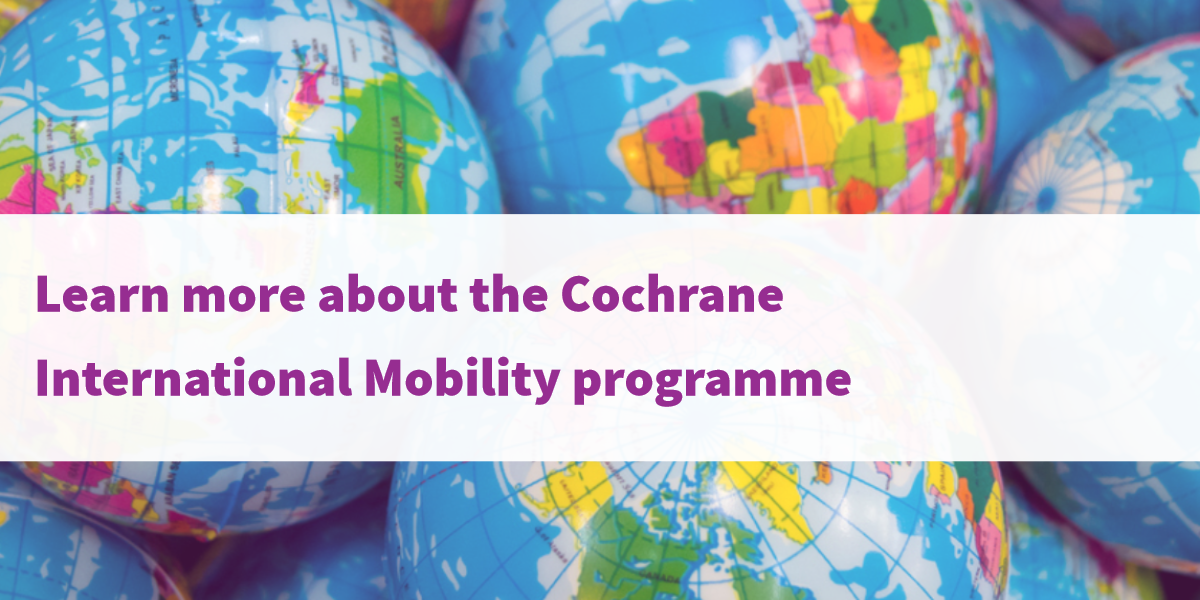
Cochrane is made up of 11,000 members and over 67,000 supporters come from more than 130 countries, worldwide. Our volunteers and contributors are researchers, health professionals, patients, carers, people passionate about improving health outcomes for everyone, everywhere.
Getting involved in Cochrane’s work means becoming part of a global community. The Cochrane International Mobility programme connects successful applicants with a placement in a host Cochrane Group, learning more about the production, use, and knowledge translation of Cochrane reviews. The prgramme offers opportunities for learning and training not only for participants but also for host staff.
In this series, we profile those that have participated in the Cochrane International Mobility Program and learn more about their experiences.

Name: Mari Kinoshita
Location: Japan
Cochrane International Mobility location: Cochrane Sweden

How did you first learn about Cochrane?
I vaguely recall how I first heard about Cochrane during my medical school years as “the resource for evidence-based medicine”, but I have to confess that I was not familiar with what the group was truly about until recently when I started to get involved in systematic reviews and appreciate its methodology while pursuing my PhD in Perinatal Medicine in Spain and Sweden. Meeting Matteo Bruschettini, the director of Cochrane Sweden, while I was doing one of my PhD projects in Lund (Sweden) was definitely a turning point for me. During a workshop in Lund, I summed up the courage to walk up and talk to him about my interest in Cochrane, and before I knew it, I was doing my CIM from Japan in Sweden, and here I am writing an article for Cochrane.org! When I first heard about CIM, I was excited to be a part of a form of collaboration between the two countries, Sweden and Japan.
What was your experience with Cochrane International Mobility?
The “official” one-month period of CIM in Lund was mainly about participating in Cochrane workshops to lay out the foundation of the methodology, and also about joining “in-person” team meetings for a systematic review “Opioids and alpha-2-agonists for analgesia and sedation in newborn infants: a systematic review”, of which the protocol has been recently published. This was all done alongside my PhD project and university courses at Lund University, thanks to the generous flexibility of the CIM program. I dearly miss the quaint university town that I fell in love with, but I feel that the best part of being physically in Lund (where Cochrane Sweden is located) was the warm, welcoming atmosphere of the Cochrane team and the consistent mentorship of Matteo. Matteo guides you through the necessary steps regardless of what your experiences are, and I have been very fortunate to be able to build a great relationship with a mentor whom I hold with great respect and admiration. Moreover, the mobility experience between Sweden and Japan has enabled me to connect with Cochrane Japan and its director, Norio Watanabe. I was also new to Cochrane Japan, but Norio has welcomed me with open arms and a big smile. CIM is often between countries within Europe due to geographical proximity, so if my CIM can contribute in any way to promote collaboration between the Cochrane teams in two of my favorite countries, that itself would be rewarding to me as a way to give back for what I have received from both teams.
What are you doing now in relation to your Cochrane International Mobility experience?
Even after leaving Sweden, I have stayed strongly connected to Cochrane Sweden and currently continuing to work together on a few reviews, including a new Cochrane Neonatal review on opioids for postoperative pain in newborns. We regularly contact each other in the review team through emails and discuss important issues at online meetings; I have also been attending many Cochrane webinars online since there is always more to learn!
Do you have any words of advice to anyone conserving a Cochrane International Mobility experience?
If you are in any bit interested in systematic reviews and evidence-based medicine, CIM is a valuable opportunity that can open many doors – so do not hesitate to reach out! Going to a new country and meeting new people can be daunting, especially if you feel that you do not have experience in the field, but really, the only thing you need to bring with you is yourself and your spark of interest! The rest is for you to find or not find on your journey in Cochrane with the supportive team behind you. How you continue your journey after CIM is totally up to you, and whatever you choose, your CIM experience would definitely have added another page in your one-and-only book. The personalized program is a casual way for anyone to get a glimpse into the worldwide network, and as it has been for me, I am sure that it would end up being only the beginning…


